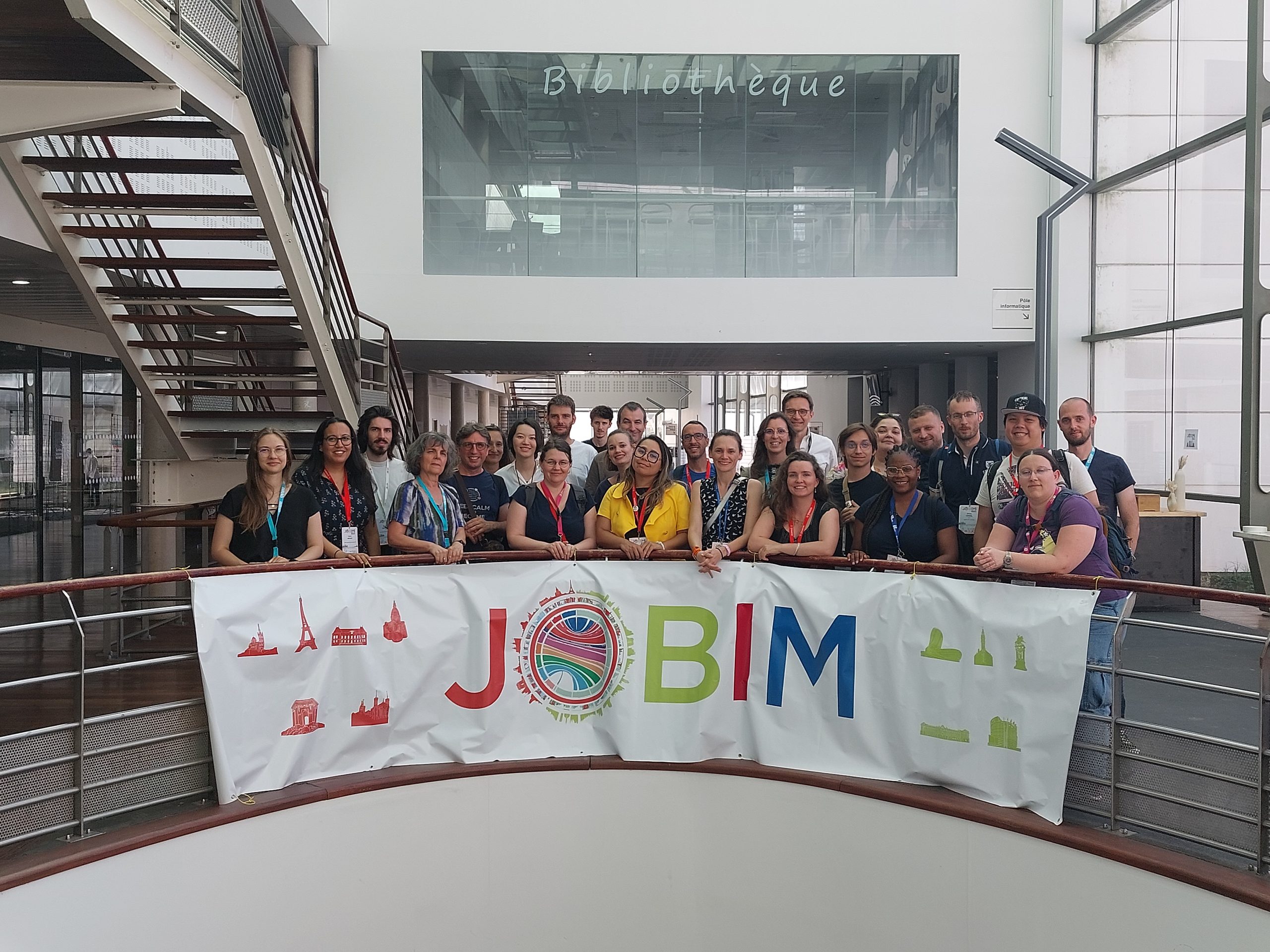
From July 8 to 11, 2025, the French Institute of Bioinformatics (IFB/ELIXIR-FR) was in Bordeaux for JOBIM 2025, the major annual gathering of the French-speaking bioinformatics community.
Talks, posters, live demos, informal discussions... this edition was especially eventful for IFB’s teams.
From day one, the IFB-core events team took over the new IFB/ELIXIR-FR booth, located at ENSEIRB-MATMECA in Talence, alongside those of the SFBI and JeBIF. Visitors could meet with IFB representatives to ask questions and learn more about two key IFB-led projects: ABRomics, dedicated to genomic surveillance of antibiotic resistance, and Galaxy France, the national instance of the Galaxy Project platform.
A live demo of ABRomics, presented by Amanda Dieuaide, offered a concrete walkthrough: from uploading bacterial genome sequencing data, to processing with various analysis pipelines, and finally exploring results through the platform’s graphical interfaces. Upcoming features currently under development were also introduced.
Another highly anticipated presentation was Madbot (#MadobotByIFB), which drew a full room. This innovative tool developed by IFB-core helps streamline the management and sharing of data and associated metadata. Madbot automates the organization, description, and submission of data to repositories like Zenodo or the European Nucleotide Archive (ENA), while complying with international standards. The result: data that is more open and accessible, in line with FAIR principles, and a simplified submission process.
JOBIM is also a key opportunity to showcase research projects and initiatives. Once again this year, IFB made a strong showing, highlighting the diversity and complementarity of its work.
Co-led by the IFB and the French National Biodiversity Data Hub (PNDB/DATA Terra), the Biodiversity Community is committed to better managing genomic data across applications. As part of the MUDIS4LS project, a special focus is placed on marine biodiversity research: data management plans, best practices, and national infrastructures aim to improve accessibility and interoperability.
As the French node of ELIXIR Europe, IFB plays a key role in developing bioinformatics skills at the European level. The poster presented projects such as TeSS, the Training Metrics Database, Learning Paths, and SPLASH, as well as initiatives for trainer education, multi-omics integration, machine learning, and multi-node AI training programs.
ATLASea aims to sequence the genomes of 4,500 marine eukaryotic species, roughly a third of France’s known marine biodiversity. Data is stored in an open-access database, BYTEsea. Led by IFB, the BYTEsea project ensures data interoperability, security, and FAIR/Open Science-compliant dissemination.
Since its launch in 2005, Galaxy has supported a wide range of scientific disciplines. Widely adopted in France (with over 10 servers), Galaxy is more than a genomics tool. It now includes 3,000+ tools across metabolomics, machine learning, and ecology. Backed by IFB and ELIXIR, UseGalaxy.fr supports large-scale projects and ensures an intuitive, FAIR-compliant analysis experience.
For more details, see the dedicated article on Galaxy Project.
The growing need for computational skills in life sciences is not always met. To address this, the Galaxy Training Network offers a FAIR training platform featuring over 450 tutorials, 135 hours of video content, and contributions from 450+ community members. It has become a key teaching tool, with dedicated resources for trainer education.
This poster highlighted UseGalaxy.fr, the French national Galaxy instance supported by IFB. With powerful compute infrastructure, thousands of tools, and an active community, the platform supports thousands of users and contributes to national and EU-scale scientific projects.
Développé dans le cadre du projet DeepImpact, un nouveau modèle de données RDF est en cours de développement pour décrire les holobiontes végétaux et les données environnementales. Ce modèle, interopérable, pourra également être utilisé pour des projets ne décrivant que des microbiotes ou des données environnementales, favorisant ainsi la reproductibilité des analyses. Ce projet sera ensuite intégré dans un système d’information afin de faciliter la collecte, le stockage et l’accès aux données.
La plateforme numérique ABRomics dédiée à la surveillance génomique et la recherche sur l’antibiorésistance, dont le développement est porté par l’IFB et l’Institut Pasteur, a présenté 2 posters dédiés.
Le premier poster a permis d’exposer les futurs workflows métagénomiques Galaxy utilisés par ABRomics, et de présenter les trois pipelines proposés, qui permettront de caractériser la résistance aux antibiotiques sans passer par l’isolement bactérien, en s’appuyant directement sur les échantillons environnementaux, animaux ou humains.
Le second poster présentait le graphe de connaissances utilisé par ABromics, afin d’assurer la structuration des données de la plateforme et son interopérabilité. Ce graphe intègre les dimensions temporelles et géographiques, conformément aux principes FAIR (faciles à trouver, accessibles, interopérables et réutilisables).
EDAM est une ontologie normalisant les termes pour l’analyse des données en sciences de la vie. Le projet open-science Bioconductor, qui propose plus de 2000 paquets à un large éventail d’applications de bioinformatique, utilise biocViews, un vocabulaire développé en interne, mais limité par son interopérabilité. L’objectif de ce projet vise à annoter les packages Bioconductor avec EDAM pour les intégrer automatiquement à l’écosystème ELIXIR pour améliorer la visibilité et l'interopérabilité des paquets. Des scripts et des méthodes basées sur des LLM facilitent cette transition, améliorant la FAIRification des ressources et les liens entre Bioconductor et ELIXIR.
L'ensemble de ces présentations et posters sont publiés et à retrouver dans leur intégralité dans la collection HAL de l’IFB-core.